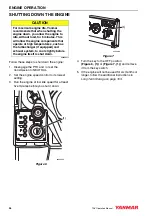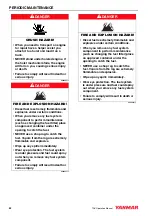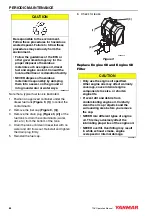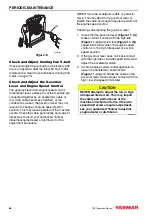
PERIODIC MAINTENANCE
TNV Operation Manual
71
PRECAUTIONS
The Importance of Periodic
Maintenance
Engine deterioration and wear occurs in
proportion to length of time the engine has been
in service and the conditions the engine is subject
to during operation. Periodic maintenance
prevents unexpected downtime, reduces the
number of accidents due to poor machine
performance and helps extend the life of the
engine.
Performing Periodic Maintenance
Perform periodic maintenance procedures in an
open, level area free from traffic. If possible,
perform the procedures indoors to prevent
environmental conditions, such as rain, wind, or
snow, from damaging the machine.
The Importance of Daily Checks
Periodic Maintenance Schedules assume that the
daily checks are performed on a regular basis.
Make it a habit of performing daily checks before
the start of each shift.
Keep a Log of Engine Hours and
Daily Checks
Keep a log of the number of hours the engine is
run each day and a log of the daily checks
performed. Also note the date, type of repair
(e.g., replaced alternator), and parts needed for
any service needed between the periodic
maintenance intervals. Periodic maintenance
intervals are every 50, 250, 500, 1000, 1500 and
2000 engine hours. Failure to perform periodic
maintenance will shorten the life of the engine.
Yanmar Replacement Parts
Yanmar recommends that you use genuine
Yanmar parts when replacement parts are
needed. Genuine replacement parts help ensure
long engine life.
Tools Required
Before you start any periodic maintenance
procedure make sure you have the tools you
need to perform all of the required tasks.
Ask Your Authorized Yanmar
Industrial Engine Dealer or
Distributor For Help
Our professional service technicians have the
expertise and skills to help you with any
maintenance or service related procedures you
need help with.
A
WARNING
0000003en
EXHAUST HAZARD!
• NEVER operate the engine in an
enclosed area such as a garage,
tunnel, underground room, manhole or
ship’s hold without proper ventilation.
• NEVER block windows, vents, or other
means of ventilation if the engine is
operating in an enclosed area. All
internal combustion engines create
carbon monoxide gas during
operation. Accumulation of this gas
within an enclosure could cause
illness or even death.
• Make sure that all connections are
tightened to specifications after repair
is made to the exhaust system.
• Failure to comply could result in death
or serious injury.
Содержание 2TNV70
Страница 1: ......
Страница 2: ......
Страница 32: ...SAFETY 14 TNV Operation Manual ...
Страница 116: ...PERIODIC MAINTENANCE 98 TNV Operation Manual ...
Страница 140: ...SPECIFICATIONS 122 TNV Operation Manual ...
Страница 141: ......
Страница 142: ......
















































